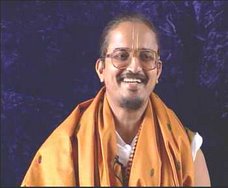Nama Article 6th November 2014
Today is Maha Raasa Poornima
The Ăzhwăr sings this, "Năvalam periyathîvinil văzhum nangaimîrgall, ido or arpudham kellîr". What is amazing? The Swamy here writes his commentary. We do not know if even the păsuram conveys this. One should observe the heart ('răsikyamăna hrdyam') of the Swamy that enjoys this. Which is the beauty/wonder here? Is it the music from the flute ('venu gănam') of Bhagavăn that is the wonder? Or, the 'mayil pîli' (peacock feather) that is worn by him on his head that is the wonder? Or, are the anklets on His Feet the wonder? Or, is His standing as 'Tribangi' the wonder? In the divine ocean of milk, the Lord bears the beauty of a crore Manmathas (the God of beauty/love), lotus like eyes, a perfectly chiseled nose, soft lips, ('kotimanmatha lăvanyan, nayanumum, champaka năsikamum, komalamăna adharamum'). Which amongst these is amazing? "Not all these", says the Swamy. "There are people sitting at home even while the Lord is playing 'răsam'! It is only this that is amazing to me!" So, 'ido or arpudham kellîr' - "Bhagavăn is playing 'răsam' yet some of you are at home without rushing to join Him!" So, with the desire that all should join the 'răsam' Periyăzhwăr called out to everyone. Then, will the daughter of Periyăzhwăr be anything less? So, she, too, calls everyone, "vaiyathu văzhvîrgăll, nămum nam păvaiku". What does she say here? It is the 'păvai' to be worshipped by us. She includes us also. When asked, "Whose house is this?" Some people will reply, 'Nam' meaning "Ours" i.e yours and mine. ('nam vîdu'). Come to our house ('nămmăthukku văngo'). So, it means she is including us, too. Some people say, "Come to my house." So, here what does she mean by saying 'the worship to be performed by us'? 'Nămum nam păvaikku'. She tells us also to take up the 'nonbu'. Even if one were not (living) during the period of 'păvai nonbu' one can do it mentally ('mănasîgama'). So, even if waking up early ('ushat kăl') in Mărgazhi month is a good tradition what is the practice followed by us? Swami Vivekananda explains excellently, "We always leave out what is important and take to that which is not of any 'săram' (importance)). What is the reason (for him saying so)? It is not enough if one wakes up early.
One should wake up early and perform Năma Sankîrtanam/Bhagavat ărădhana. One says, 'I woke up at 3'o clock in Mărgazhi.' But on waking up watching T.V. or reading the newspaper is of no use. Once you wake up so early you must worship Bhagavăn ('Bhagavat ărădhana'). Once you wake up you must perform Năma Sankîrtanam. Similarly, mere fasting on Vaikunta Ekădasi is of no use. Along with the fast one should meditate on Bhagavăn ('Bhagavat dhyăna'). Why is fast ('upavăsam') ordained for that day? If one goes on fast the mind becomes one-pointed. 'Upa văsam' means to be (live) near Bhagavăn. So, it is not enough if we take hold of just the literal meaning ('sthula') but one should understand the underlying meaning ('sukshma') also.
Please check these: Excerpts from a discourse by our Sri Sri Muralidhara Swamiji
Chant the Mahamantra Nama kirtan :
Hare Rama Hare Rama Rama Rama Hare Hare
Hare Krishna Hare Krishna Krishna Krishna Hare Hare

No comments:
Post a Comment